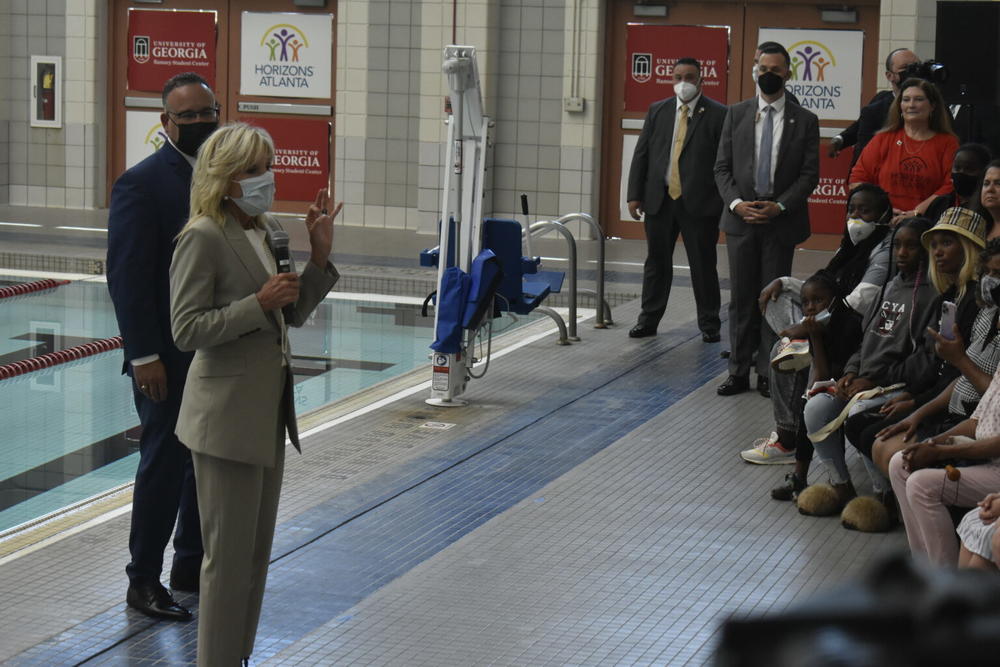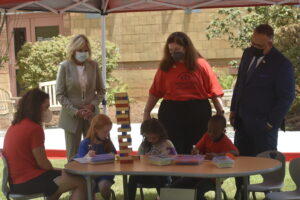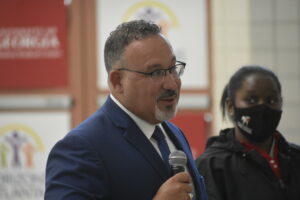
Caption
First lady Jill Biden touts the role of the American Rescue Plan’s learning loss prevention funds to a group of parents in Athens.
Credit: Ross Williams/Georgia Recorder

First lady Jill Biden touts the role of the American Rescue Plan’s learning loss prevention funds to a group of parents in Athens.
First Lady Jill Biden came to Athens Thursday to promote a key educational piece of her husband’s American Rescue Plan.
The first lady’s visit came hours after the White House announced President Joe Biden has contracted COVID-19. Jill Biden did not mention her husband’s diagnosis during her brief remarks, but at a previous stop in Detroit, Biden said the president is feeling well and working remotely.
The first lady’s office said she is testing regularly and wearing a mask per the Centers for Disease Control and Prevention guidelines for close contacts.
Jill Biden and Education Secretary Miguel Cardona stopped by the University of Georgia, where students from nearby Barnett Shoals Elementary School are getting some extra lessons this summer.
Georgia received $4.2 billion from the American Rescue Plan’s Elementary and Secondary School Emergency Relief funds, roughly $1 billion of which the state is setting aside for academic recovery, according to the White House.

First lady Jill Biden and Education Secretary Miguel Cardona watch as children play a math game using wooden blocks at Horizons National summer learning program at the University of Georgia.
About $193,000 of that money went to Horizons National, an educational equity group, to expand its year-round programming for Athens children.
Biden, a veteran teacher who holds a doctorate in education and now teaches at a community college, visited with children as they did educational activities and watched as they splashed into a university pool for swimming lessons.
She told parents she has witnessed the pitfalls of pandemic school closures first-hand.
“Just like you and your students, I was teaching over Zoom, and so I saw how hard it was for my students, to keep them going, keep their attention,” she said.
Biden said the president understands that a return to the classroom did not erase the learning loss or social and emotional toll of pandemic school closures, and summer learning programs like Horizons are helping to get children back on track.
“One thing I love about my husband, our president, is that he gets the importance of education,” she said. “We talk about education all the time, because I’m still in the classroom, and he’ll come home and say, ‘How was your day?’ I tell him all about my students, and he feels like he’s right there in the classroom beside me. He gets it. And that’s why it was so important to pass the American Rescue Plan, because we knew we have to help our children, whether it’s academically, emotionally, socially.”
Biden and Cardona’s visit was part of a multi-state tour of similar programs with stops in Michigan and Connecticut.
“The American Rescue Plan dollars are intended to provide programs like this one, and make up for some of that time, where students can learn with their teachers, learn with their friends, and we’ve been seeing great examples of it, and we saw some wonderful examples here today,” Cardona said.

U.S. Education Secretary Miguel Cardona.
It looks like the anti-learning loss investment is starting to pay off, said Stephen Owens, education policy analyst at the Georgia Budget and Policy Institute.
“If we compare data across the nation, we’re starting to see some gains in students recovering a lot of that lost instructional time,” he said. “My own kid’s school added on 30 minutes to the school day and needed to compensate staff accordingly. There’s been some hesitation for districts to spend this money in a way that they can continue to keep that investment even after the money is spent. Some people wanted to see some large purchases all up front, but from what I’ve seen, a lot of school districts have been really wise about making sure that this money is spent on these kids, and not in such a rash way that they’re left with a bill after it’s gone.”
What to do when the money runs dry is a concern for teachers and administrators, Owens said.
Analysts say another American Rescue Plan achievement, the expanded child tax credits of 2021, caused a major reduction in child poverty nationwide by refunding up to $300 per child per month in parents, but the relief ended last year when attempts to renew it died in Congress.
“It’s hard to watch the transformational things that can happen if we actually invest in these kids, and then say, like, OK, time is up,” Owens said.
But Owens said he is hopeful state investments could make up for the revenue once the federal money expires.
“We don’t have to have this fiscal cliff for schools that are spending this money to serve these kids,” he said. “The state could support the schools moving forward. We’ve got this nice long runway to find out what’s working and how the state can continue that investment moving forward. We still have a lot of money in the governor’s ARP emergency fund. We have a lot of revenue that we can raise. We can turn this into long-lasting things for Georgians, if we have the political will.”
This story comes to GPB through a reporting partnership with Georgia Recorder.